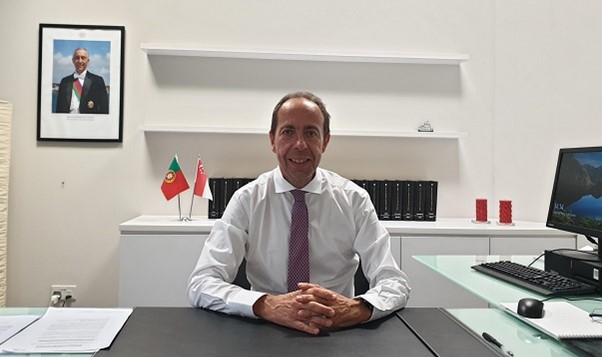By Mário Miranda Duarte, the Portuguese Ambassador to Singapore

We are living at a crucial moment in our history, where the choices we make today will define the future of our societies and the planet. We must act with boldness and vision, guided by science and responsibility. We need to invest in innovation, renewable energies, education and smart public policies to build a sustainable, prosperous and equitable future.
We know that decarbonisation is no longer just a choice but the only path to grow sustainably while respecting the natural limits of our planet. By investing in energy efficiency improvements, we can achieve climate goals, strengthen energy security, create jobs, boost economic growth, and improve the quality of life of our citizens.
Bold actions and strategic investments
But to achieve these goals, we need a robust common policy framework that can finance the climate and energy transition effectively:
- A solid and secure regulatory framework needs to be established to help reduce risk and incentivise investment.
- It is crucial to implement fiscal and financial incentives that make investments more attractive and accessible, strengthening public-private partnerships, green bonds and investments in renewables and storage, and others to mobilise capital and bridge the investment gap.
- We need to develop mature capital markets capable of attracting and channelling private investment, especially for companies that are committed to renewable energies and energy efficiency.
The energy transition is a unique opportunity, but also a huge challenge that we cannot underestimate.
Achieving Carbon Neutrality by 2045
Portugal is aligned with the UAE Consensus, the historic agreement reached at the last COP28. This provides for countries to make "a transition away from fossil fuels in a fair, orderly and equitable way, in order to achieve carbon neutrality by 2050".
Portugal has ambitious goals for reducing greenhouse gas emissions, aiming to achieve carbon neutrality by 2045, five years ahead of the targets set by the European Union. Since the end of 2021, Portugal has definitively stopped using coal to produce electricity and is gradually phasing out the use of fossil fuels, replacing them with indigenous production from renewable sources.
However, for this transformation to be truly effective, it is imperative that we strengthen the financial instruments needed to make clean energy more accessible and reduce investment costs. We need to increase public funding to bridge the gap between the cost of investment and the expected return.
There needs to be an increase in the CAPEX state aid ceiling for strategic projects, such as Green Hydrogen. Tax and financial incentives are also needed, such as tax credits or loans for clean energy projects like the installation of solar or wind energy systems.
Renewable energy auctions need to be promoted because they attract private investment and provide predictability for investors. Similarly, feed-in tariffs are essential instruments that guarantee a fixed price for clean energy, incentivising its production in a stable and sustainable way.
For this to happen, we need to:
- Create robust fiscal and financial incentives for clean energy projects that also improve energy efficiency.
- Invest in research and development projects, creating synergies with private companies to reduce investment risks and promote the creation of jobs and economic opportunities.
A Fair and Sustainable Energy Transition
Portugal is already supporting the development of diversified and complementary solutions, such as biomethane, green hydrogen, offshore wind energy and photovoltaic solar energy. All solutions focused on improving energy efficiency.
The transition we are experiencing is a generational challenge that must be transformed into comprehensive policies capable of fulfilling its economic, geopolitical and social potential.
Today, raw materials are at the heart of efforts to decarbonise and electrify the economy as we replace fossil energies with renewable energies, but we need to ensure that we don't swap dependence on fossil fuels for dependence on raw materials, and this involves efficient management of resources and optimisation of energy consumption.
Portugal is firmly committed to ensuring a fair and sustainable energy transition, in which energy efficiency must be a fundamental pillar of this transition, ensuring the competitiveness of the economy and social well-being.